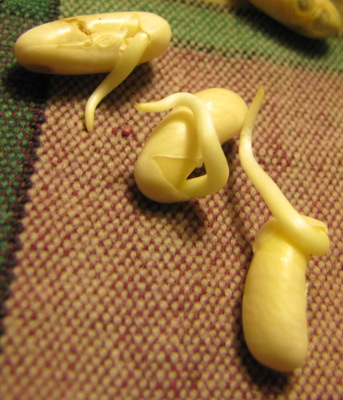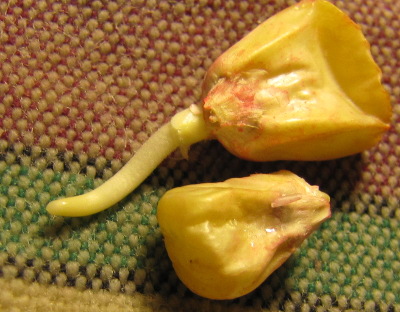
Seed germination test results
 In our seed
germination test,
100% of our corn seeds and 60% of our bean seeds germinated in 2
days. The other two bean seeds promptly got moldy, suggesting to
me that they probably weren't viable. The beans are seeds that I
grew myself, and I didn't go through and pull out obviously damaged
seeds (something I often do while planting), so I suspect the
germination rate of the ones I hand select for planting is more like
80%. I concluded that the corn is a definite keeper, and I'll
just plant the beans a bit more thickly than I normally would due to
their age.
In our seed
germination test,
100% of our corn seeds and 60% of our bean seeds germinated in 2
days. The other two bean seeds promptly got moldy, suggesting to
me that they probably weren't viable. The beans are seeds that I
grew myself, and I didn't go through and pull out obviously damaged
seeds (something I often do while planting), so I suspect the
germination rate of the ones I hand select for planting is more like
80%. I concluded that the corn is a definite keeper, and I'll
just plant the beans a bit more thickly than I normally would due to
their age.
 Nothing much seemed to happen
for the rest of the week, except for a peanut and some parsley
succumbing to mold. The same temperature and humidity that
promote seed germination are perfect for mold growth, but I figure that
a viable seed should be able to survive mold and sprout. Finally,
seven days after starting the experiment, one peanut sprouted and an
onion seed showed a tinge of white that might be an incipient root
pushing through the seed coat. I'll give the seeds one more week,
then put in my seed order.
Nothing much seemed to happen
for the rest of the week, except for a peanut and some parsley
succumbing to mold. The same temperature and humidity that
promote seed germination are perfect for mold growth, but I figure that
a viable seed should be able to survive mold and sprout. Finally,
seven days after starting the experiment, one peanut sprouted and an
onion seed showed a tinge of white that might be an incipient root
pushing through the seed coat. I'll give the seeds one more week,
then put in my seed order.
By the way, I realized
that the days to germination chart I linked to last time is really days
to emergence from the soil. That's a very different length of
time since seeds first send down their roots and get established before
sending up their cotyledons to poke out of the soil. As my
experience suggests, you should see sprouts of at least beans and corn
in a couple of days if conditions are optimal for your germination test.
Want more in-depth information? Browse through our books.
Or explore more posts by date or by subject.
About us: Anna Hess and Mark Hamilton spent over a decade living self-sufficiently in the mountains of Virginia before moving north to start over from scratch in the foothills of Ohio. They've experimented with permaculture, no-till gardening, trailersteading, home-based microbusinesses and much more, writing about their adventures in both blogs and books.
Want to be notified when new comments are posted on this page? Click on the RSS button after you add a comment to subscribe to the comment feed, or simply check the box beside "email replies to me" while writing your comment.

Reading this entry reminded me of one of the sites on seeds and a way to get germination from old seeds with a quite high success rate. I don't remember the site url, but basically what they did was take the seeds and depending on what they were, soak them in water for hours or up to a day then lay them out on a moist media (like paper towels) and when most of them sprouted transfer them to pots or trays of compost, then to the garden when appropriate.
Nothing was stored in plastic and some were stored in a freezer for a few weeks before doing this, while the rest were in paper packs stored in an organized box in a cabinet. All the seeds were said to be at least two years old.
I was surprised that the germination was so high over 80%. It looked like tedious work though as some of the seedlings were extremely small. If you get a green house or use cold frames it might be worth some thought.
Pre-germination tactics like that are widely variable by type of seed. I routinely presoak pea seeds, although I like to germinate them straight in the garden for simplicity.
I'm not sure the folks who you read about actually needed to do anything special, though. Different types of seeds last very different lengths of time, and unless it was pepper, parsnip, parsley, onion, or corn seeds, you'd expect nearly full germination after two years with most seeds. 80% is actually a bit low (although they did store their seeds sub-optimally, the way I do.)